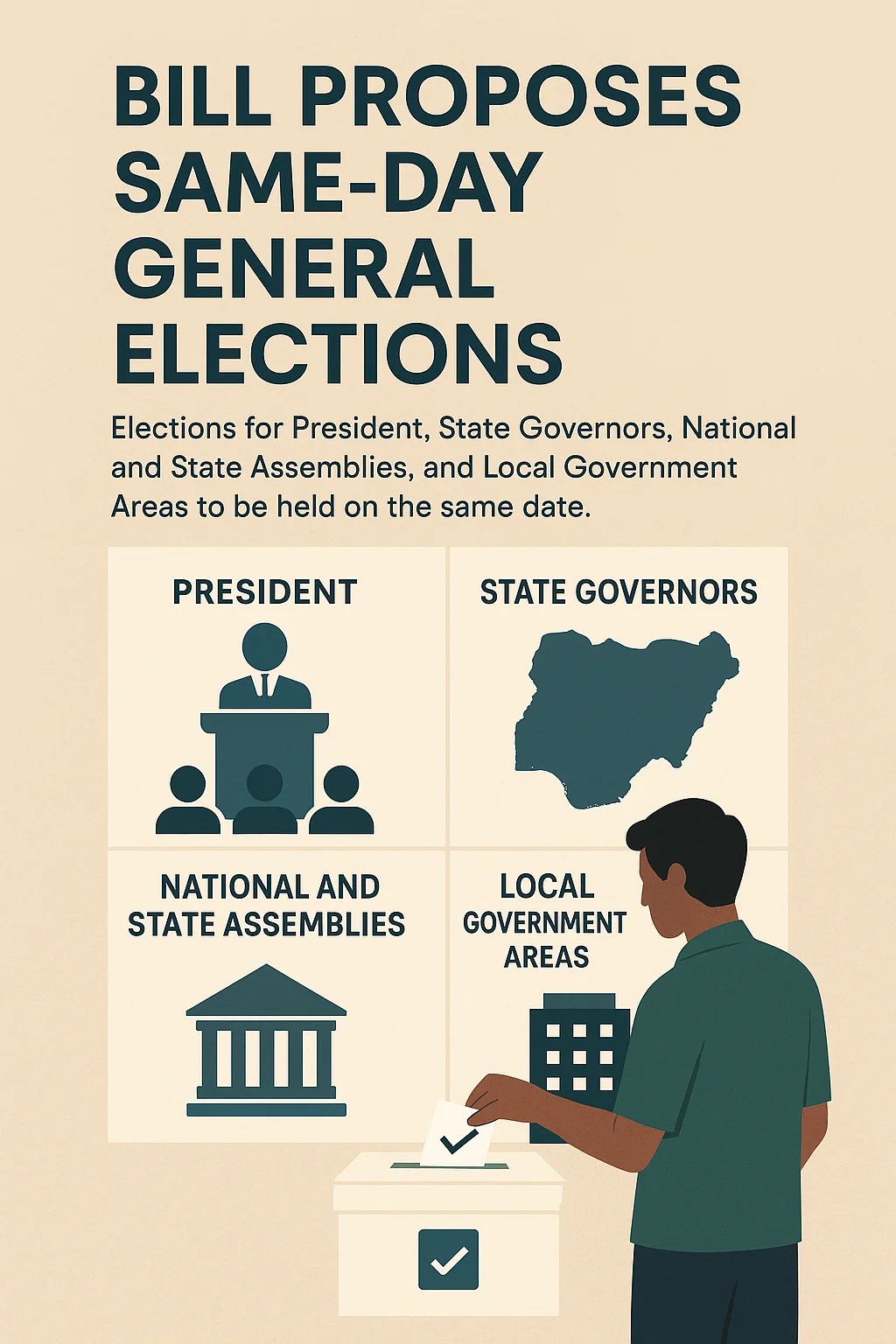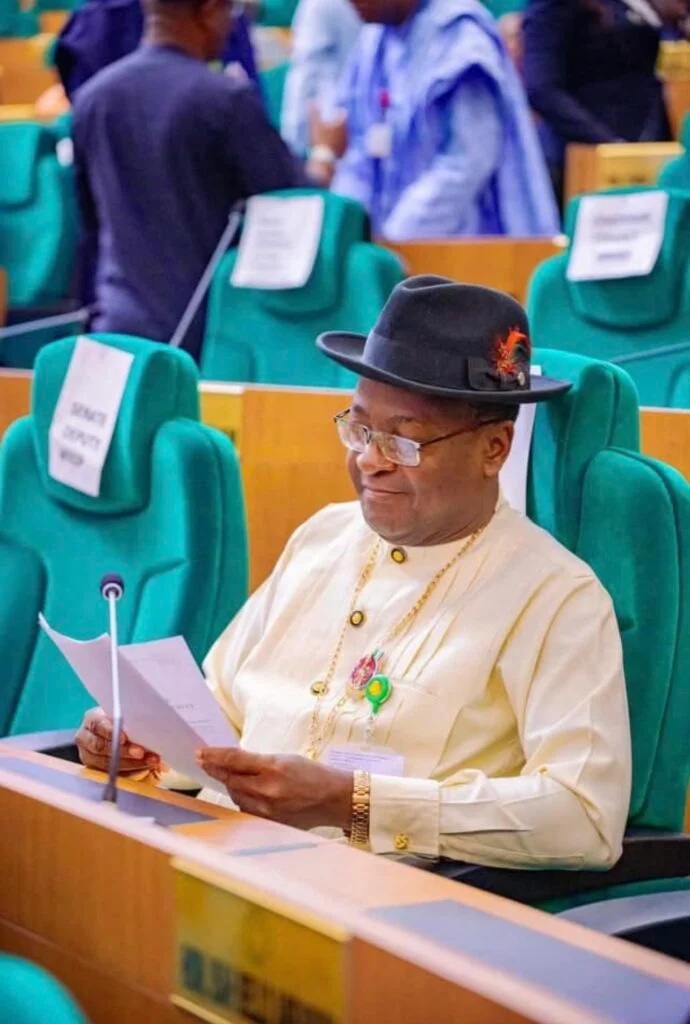….as INEC Says it is not feasible.
A Unified Electoral Framework: Bill Proposes Same-Day Elections Across All Tiers of Government in Nigeria

by Whitney Igariwey
Introduction
In a landmark legislative effort aimed at reshaping Nigeria’s electoral landscape, Hon. Francis Ejiroghene Waive of the Ughelli North/Ughelli South/Udu Federal Constituency (APC, Delta) has sponsored a bill seeking to mandate that general elections into all major public offices be conducted simultaneously on the same day. This proposal covers elections into the offices of the President, State Governors, National Assembly, State Houses of Assembly, and Local Government Area (LGA) Councils.
If passed into law, this bill would significantly enhance electoral efficiency, reduce operational costs, and streamline governance cycles across the country.

Hon. Francis Ejiroghene Waive
Context and Rationale
Nigeria’s electoral calendar has long been characterized by staggered elections, often resulting in extended political tension, increased financial costs, and voter fatigue. The Independent National Electoral Commission (INEC) typically conducts federal and state elections in phases, with local government elections administered separately by State Independent Electoral Commissions (SIECs). This fragmentation not only drains public resources but also contributes to inconsistent governance cycles and duplicated electoral logistics.
The proposed bill is currently under consideration by the National Assembly, which aims to correct these inefficiencies by consolidating the electoral timeline, ensuring all levels of government are elected on a single, harmonised election day. This bold proposition, if enacted, would represent one of the most comprehensive reforms of Nigeria’s democratic framework since the advent of the Fourth Republic.
Key Features of the Bill
Single Electoral Day:
All general elections, Presidential, Gubernatorial, National and State Assembly, and Local Government, would be conducted on the same day, nationwide.
Amendments to Key Legal Frameworks:
This bill proposes amendments to the Electoral Act 2022 and relevant sections of the 1999 Constitution (as amended) to align tenures and electoral schedules.
Enhanced Coordination Between INEC and SIECs:
A harmonized legal and operational framework would be developed to ensure both electoral bodies work in sync for seamless execution.
Anticipated Benefits
Cost Reduction:
Eliminating multiple election cycles would significantly cut down the costs of logistics, personnel, and materials.
Higher Voter Turnout:
A unified election day may increase civic participation by making the process more accessible and less tiring for voters.
Reduced Electoral Conflict:
A single-day electoral event shortens the electioneering period, potentially lowering tensions and political violence.
Synchronized Governance:
Aligning the tenure of elected officials could lead to more consistent development plans and policy implementation.
Implementation Challenges
Operational Complexity:
Managing one-day elections across all tiers of government will require massive logistical preparation and security coordination.
Resistance to Change:
Political actors who benefit from staggered elections may oppose the bill for strategic reasons.
Legal and Constitutional Hurdles:
Amending the Constitution to synchronize tenures is a complex process requiring broad consensus at the National and State levels.

Conclusion
Hon. Francis Waive’s proposal to unify Nigeria’s elections represents a bold and strategic attempt to modernize the nation’s democratic processes. By advocating for a single electoral day, the bill seeks to enhance transparency, efficiency, and public trust in the system.
As the National Assembly deliberates on this historic bill, stakeholders across the electoral ecosystem, from INEC and civil society to political parties and the media, must critically engage with its implications.
Sources:
Independent National Electoral Commission (INEC). (n.d.). Official website of the Independent National Electoral Commission of Nigeria. Retrieved May 8, 2025, from https://www.inecnigeria.org
National Assembly of Nigeria. (2011). Constitution of the Federal Republic of Nigeria (1999, as amended). Retrieved from https://www.nass.gov.ng/document/download/6380
The Nation. (2024, April 17). Reps pass Electoral Act amendment bill for second reading, seek conduct of general elections in one day. Retrieved from https://thenationonlineng.net/updated-reps-pass-electoral-act-amendment-bill-for-second-reading-seek-conduct-of-general-elections-in-one-day/
Voice of Nigeria. (2024, April 18). Bill for a uniform election date passes second reading in Nigeria’s House of Representatives. Retrieved from https://von.gov.ng/bill-for-a-uniform-election-date-passes-second-reading/
Conduct of all elections in 1 day not feasible – INEC official
An official of Independent National Electoral Commission (INEC) has advised the National Assembly to jettison a bill before it, seeking the conduct of all elections in one day.
The official, who spoke with the News Agency of Nigeria (NAN) on condition of anonymity on Thursday in Abuja, said that the bill, if passed, might truncate the county’s electoral system.
NAN reports that there has been a growing momentum in certain quarters in the country for a major electoral reform, including the conduct of all five major elections – presidential, senatorial, House of Representatives, governorship and House of Assembly – on a single day.
NAN also reports that The Patriots, a group of elder statesmen, led by a former Commonwealth Secretary-General, Chief Emeka Anyaoku, had made the call during its recent national summit on the Future of Nigeria’s Constitutional Democracy.
The House of Representatives had equally proposed the reform in the Electoral Act 2025, which had passed second reading.
If the proposal is upheld, the reviewed Electoral Act will empower INEC to simultaneously conduct all elections in one day.
NAN reports that the proponents of the reform had argued that a single-day vote would be less vulnerable to possible manipulation and vote-buying and streamline electoral process as well as save time and cost, among other advantages.
However, the INEC official said that the question was not really about the capacity of INEC to conduct all elections in one day, but the practicability of the proposal.
“It’s about the practicality of the concept, the purpose of this latest move and what the whole thing intends to achieve.
“What is wrong with the current method? Will conducting all elections same day guarantee credibility? Will it produce a different outcome from what we are having now?
“What is the practicality of it? Did the lawmakers seek INEC’s opinion before embarking on this move?” the official queried.
According to the official, since the constitution gives INEC the exclusive power to determine the date of an election, the lawmakers should not try to erode the power.
The official argued that there were reasons INEC currently holds general elections in two parts, with the presidential and national assembly coming first and the governorship and house of assembly following.
“Even as things stand now, the commission is still finding it challenging to deal with the logistics aspect.
“Remember, for the presidential and national assembly elections, voting takes place simultaneously between 8.30 a.m. and 2.30 p.m. in over 176,000 polling units across 36 states and the Federal Capital Territory. Just imagine, for a moment, what all that entails.
“After that, the process of sorting and counting the ballot papers begins, followed by collation at the ward, local government and state levels.
“After that, returning officers will proceed from each of the states to the National Collation Centre in Abuja to physically present their individual results to the Chief Electoral Commissioner of the Federation, that is, the INEC Chairman.
“He is the only individual empowered by the constitution to announce the result of a presidential election,” the official said, adding that the process takes lots of time.
The INEC official said that adding the burden of other elections to the first part (presidential and national assembly) might truncate the process.
To the official, the idea should simply be dropped. (NAN)
Do you have news for us? Or feedback? Reach us at info@theplenary.com.ng, on WhatsApp: 08126247308, 08050636363
